Shows
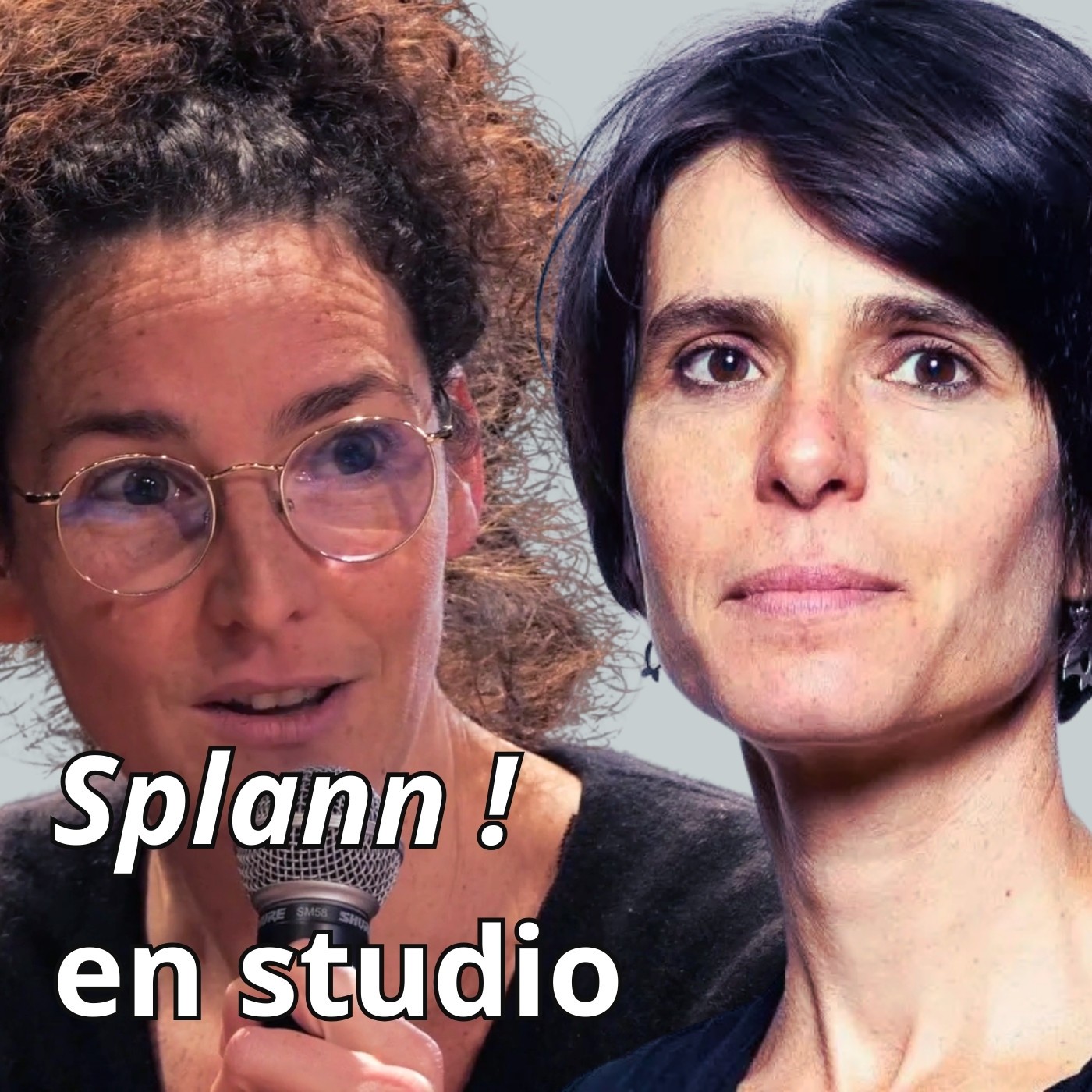
« Splann ! » en studioEnquêter sur l'agriculture malgré l'adversité, avec Julie Lallouët-Geffroy et Nolwenn Weiler pour Bretagne culture diversitéPeu après la publication de notre dossier sur la destruction du bocage, les journalistes Julie Lallouët-Geffroy et Nolwenn Weiler ont participé à un épisode de L’Abécédaire de la Bretagne, un podcast produit par l’association Bretagne culture diversité. Celui-ci a été mis en ligne le 15 mai 2024.
Pour la lettre « E » comme enquête, Arnaud Wassmer a choisi de se pencher sur le fonctionnement de « Splann ! », média régional à but non lucratif fondé en 2020, qui cultive un intérêt marqué pour les questions agricoles.
« C’est parti d’un mouvement de défense de collègues qui ont...
2025-08-1837 min
From Our Neurons to YoursMemory Palaces: the science of mental time travel and the brain's GPS system | Lisa Giocomo (Re-release)Today we are re-releasing an episode we did last year with Stanford neurobiologist Lisa Giocomo exploring the intersection of memory, navigation and the boundaries we create between ourselves and the world around us.This episode was inspired by the idea of memory palaces. The idea is simple: Take a place you're very familiar with, say the house you grew up in, and place information you want to remember in different locations within that space. When it's time to remember those things, you can mentally walk through that space and retrieve those items.This...
2024-09-2625 min
From Our Neurons to YoursWhy new Alzheimer's drugs don't work | Mike Greicius, Stanford University School of MedicineIn the past few years, Big Pharma has released not one, but three new treatments for Alzheimer’s disease. Aducanemab (2021), Lecanemab (2023), and Donanemab (2024), are the first treatments to effectively clear the brain of amyloid plaques — the sticky protein clumps whose build-up in the brain has defined the disease for decades. The problem? They may not help patients at all.Today’s guest, Stanford neurologist Mike Greicius, considers the new amyloid-clearing drugs a major disappointment — and worse, says they likely do more harm than good for patients.Despite this critique, Greicius, thinks that the...
2024-09-1225 min
From Our Neurons to YoursDepression's distinctive fingerprints in the brain | Leanne Williams, Stanford UniversityGetting help for depression can be like purgatory. Setting aside for a moment the stigma and other barriers to seeking treatment in the first place, finding the right combination of medication and/or therapy can be a months- or years-long process of trial and error. And for about one third of people, nothing seems to work.Today we're talking with Dr. Leanne Williams, the founding director of the Stanford Center for Precision Mental Health and Wellness and Vincent V.C. Woo Professor in the Stanford Department of Psychiatry and Behavioral Sciences. Williams and...
2024-08-2928 min
From Our Neurons to YoursHow the brain helps cancers grow | Michelle MonjeToday, we're talking with Stanford neuro-oncologist, Michelle Monje. This is actually the third time we've had Michelle on the show, in part because she's been a pioneer of three exciting frontiers in neuroscience — so far! This week, we're going to talk about cancer neuroscience. Michelle founded this new field with her discovery that deadly brain tumors not only link up physically with the healthy brain tissue surrounding them, but the cancers actually need the brain's electrical activity to grow and spread.It turns out that many cancers — not only in the brain — depend on nervous system...
2024-08-1521 min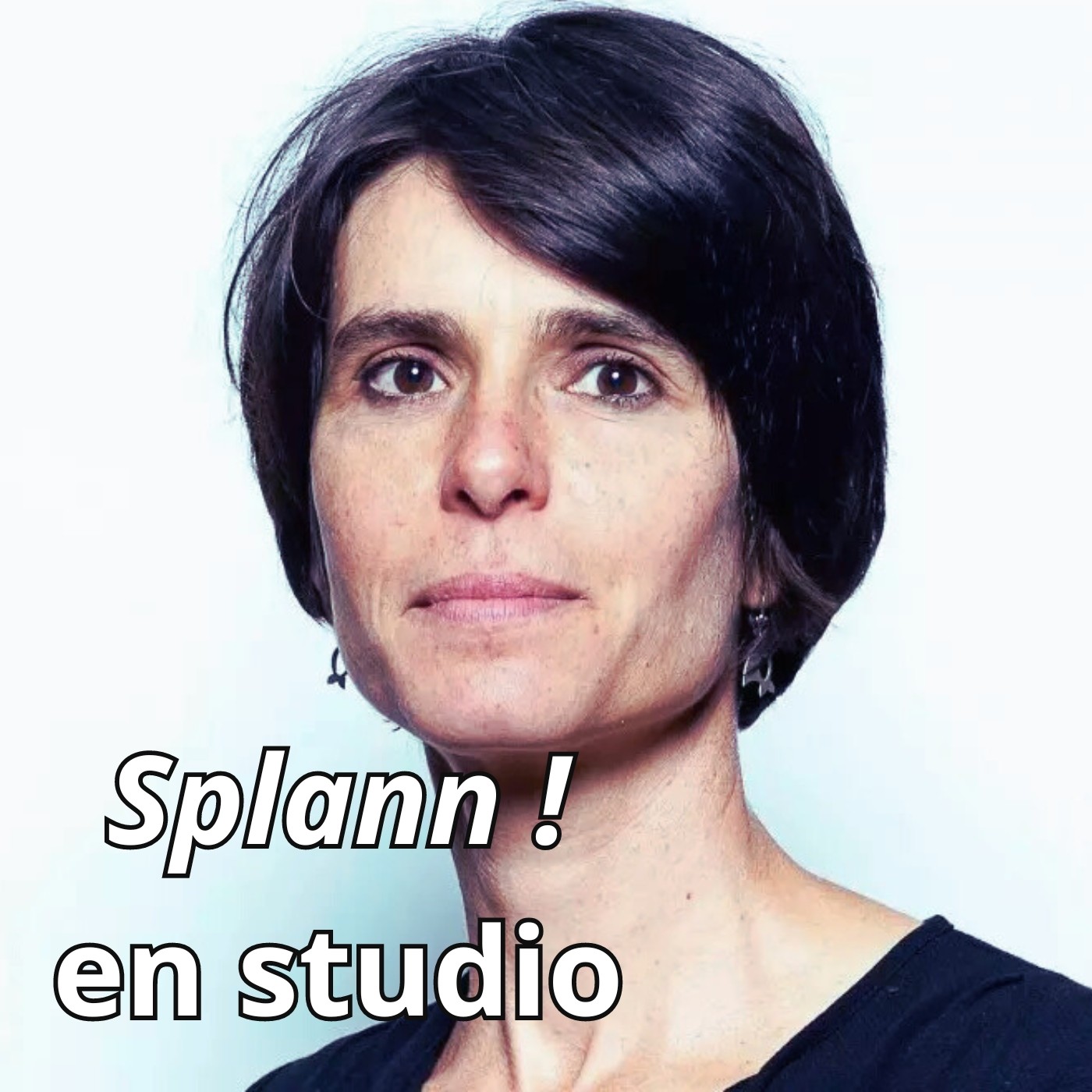
« Splann ! » en studio« La destruction des haies s'accélère depuis 10 ans en Bretagne », Nolwenn Weiler sur Canal BNolwenn Weiler a été interviewée par Lucie Louâpre, dans l’émission L’Arène, sur Canal B, le 3 avril 2024. Notre journaliste a présenté son enquête « Bocage, la fin d’un paysage », menée avec Yann-Malo Kerbrat.
En dépit des idées reçues et des moyens alloués, bien après le remembrement opéré après-guerre, la destruction du bocage breton se poursuit. Il s’accélère même depuis dix ans, en lien avec la concentration du nombre d’exploitations agricoles. Il s’agit pourtant d’un allié précieux pour la préservation de la biodiv...
2024-08-0317 min
From Our Neurons to YoursUnraveling Timothy Syndrome: the new science of human brain development | Sergiu PascaThis week on From Our Neurons to Yours, we're talking about using new techniques for growing human brain tissue in the lab to solve a rare neurological disorder.Host Nicholas Weiler sits down with Sergiu Pasca an innovative Stanford scientist who has developed groundbreaking technologies to grow human brain tissue in the lab, creating "organoids" and "assembloids" that model brain disorders like autism and schizophrenia. Pasca describes the process of turning patient skin cells into embryo-like stem cells and then into functional brain cells that can live and develop for over two years, a...
2024-08-0130 min
From Our Neurons to YoursHow VR could help treat depression with "radical behaviorist" Dr. Kim BullockToday, we're going to talk about virtual reality and how it could be used to treat depression. We're talking with psychiatrist Kim Bullock, the founding director of Stanford's Neurobehavioral Clinic and Virtual Reality & Immersive Technologies (VRIT) program. Dr. Bullock — a physician certified in Neuropsychiatry, Psychiatry, and Lifestyle Medicine — calls herself a "radical behaviorist." Like other practitioners of cognitive behavioral therapy (CBT), she sees the troublesome thoughts and emotional states of many psychiatric disorders as just another form of behavior, which can be reshaped through self awareness and practice — much like you might work at avoi...
2024-07-1821 min
From Our Neurons to YoursElectronic skin and the future of wearable technology | Zhenan BaoThe skin is full of contradictions. It’s soft and sensitive, but also tough and resilient, even self-healing. It’s both the barrier that protects us from infections and our most intimate connection with the outside world. Today’s guest, Zhenan Bao, has spent the last two decades reverse engineering the skin’s many remarkable properties in order to create wearable electronics that are just as soft, flexible, and versatile as the skin itself.Bao envisions a world where stick-on devices could help heal injuries, manage anxiety, and even enhance o...
2024-07-0423 min
From Our Neurons to YoursHow a new kind of brain plasticity could help make sense of addiction | Michelle Monje and Rob MalenkaThis week, we're diving into recent research that sheds light on a new form of brain plasticity involving changes in the insulation of nerve fibers — called myelin. It turns out that myelin plasticity is implicated in a number of serious conditions, from epilepsy to drug abuse and addiction.We're excited to bring back two previous guests on the show to share their insights on this previously unknown form of plasticity: Stanford psychiatry professor Rob Malenka (S1 E1 - Psychedelics and Empathy), a pioneer in the study of synaptic plasticity and addiction, and neuro-oncologist Michelle Monje (S1 E1...
2024-06-2022 min
From Our Neurons to YoursOur plastic brains: learning, memory and aging with the one and only Carla Shatz (Rerelease)-- We're re-releasing our conversation with Carla Shatz, one of our favorites from the archive, which comes up all the time on the show in the context of brain plasticity and aging. Enjoy, and see you next time! -NW -- When we're kids, our brains are amazing at learning. We absorb information from the outside world with ease, and we can adapt to anything. But as we age, our brains become a little more fixed. Our brain circuits become a little less flexible. You may have heard of a concept called neuroplasticity, our b...
2024-06-0621 min
From Our Neurons to YoursNeuroscience and AI: What artificial intelligence teaches us about the brain (and vice versa) | Surya GanguliThe powerful new generation of AI tools that has come out over the past few years — DALL-E, ChatGPT, Claude, Gemini, and the rest — have blown away our old ideas about what AI can do and raised questions about what it means for computers to start acting... intelligent?This week, we ask what the rise of these systems might teach us about our own biological intelligence — and vice versa. What does modern neuroscience have to say about how AI could become as flexible, efficient, and resilient as the human brain. Few people are better positio...
2024-05-2327 min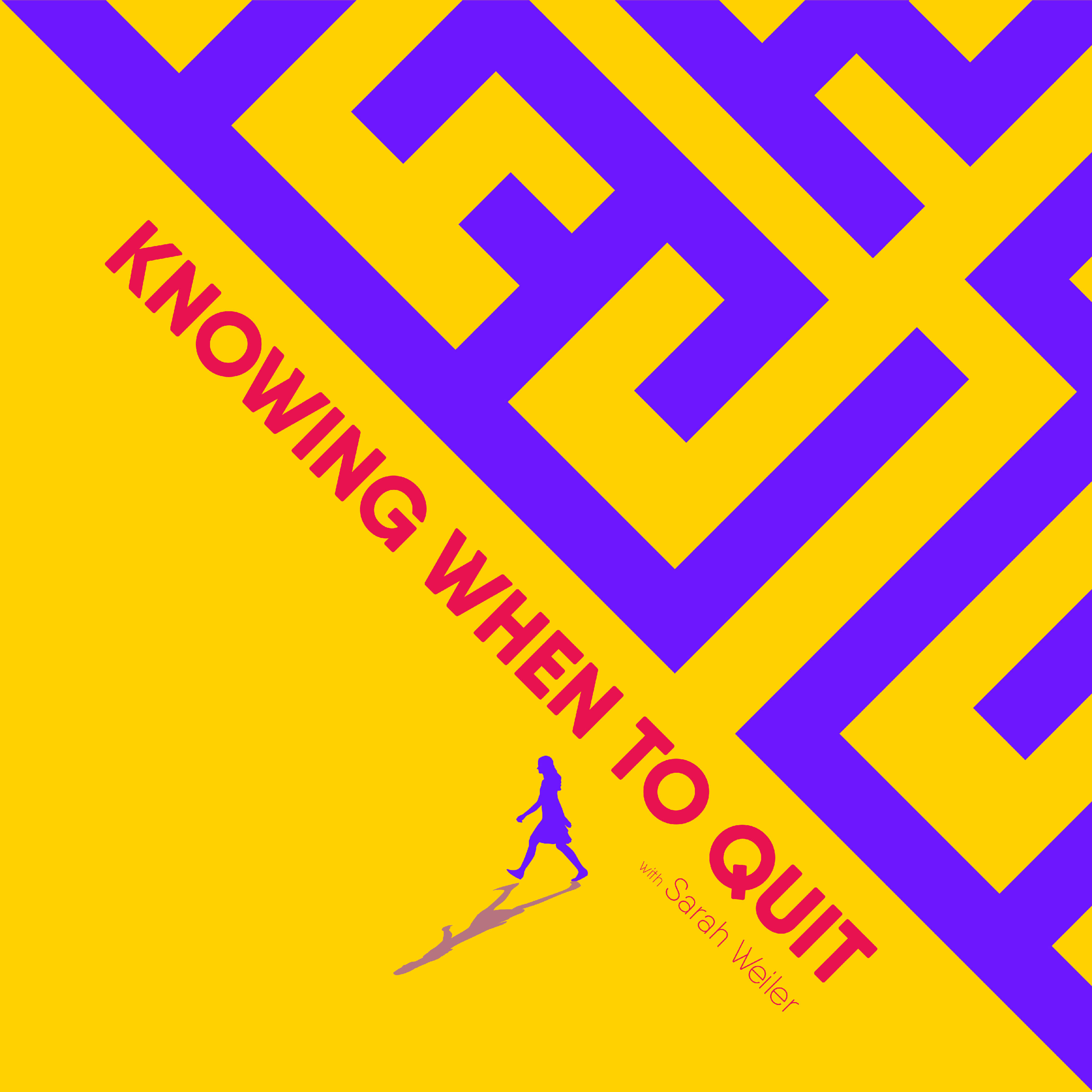
Knowing When to QuitS3 E9 - How do I face the end of my pet's life with love? - with Sieske ValkToday we're talking to Sieske Valk about the difficult, and often avoided part of pet ownership - the end of their life. Sieske is an End of Life Doula and an advocate for ageing pets; She guides pet guardians through the autumn of their best friend's life.Combining a background in veterinary medicine and the social sciences, she has set up Autumn Animals to support people in maintaining a good quality of life for both their pets and themselves and to hold space for celebrating the human-animal bond until the end and beyond. I...
2024-05-231h 04
From Our Neurons to YoursHow we remember, why we forget | Anthony WagnerAt some point in our lives, we all struggle with memory — learning a new name, remembering that book you were reading just yesterday or that word on the tip of your tongue. So what can neuroscience teach us about why we remember, why we forget, and how we might even improve our memories? To answer this question, I spoke with neuroscientist Anthony Wagner, a memory expert in Stanford's Department of Psychology.Learn MoreWagner lab websiteRecent lab publicationsAnthony's new book: Brain Sciences for Lawyers, Judges, and Po...
2024-05-1629 min
From Our Neurons to YoursPsychedelics Part 2: How do drugs alter our perceptions? | Boris HeifetsToday, we're going to talk about how psychedelics alter our perception of reality and what that says about... reality! Welcome to part two of our conversation with Stanford anesthesiologist and psychedelics researcher Boris Heifets! Last time, we talked with Boris about the question of why psychedelics help people with mental health disorders. This week, we're going to dive into a different question, which is to explore how psychedelics work in the brain. How are they able to alter something as fundamental as our perceptions of reality — and could understanding these effects tea...
2024-05-0923 min
From Our Neurons to YoursWhy our brains are bad at climate change | Nik SaweThis week on From Our Neurons to Yours, we're talking about the neuroscience of climate change with neuroeconomist Nik Sawe.If you follow the science or the news, you know how big of a risk climate change is. Storms, coastal flooding, heat waves, extinctions, mass migration — the list goes on. But — as you can probably also appreciate — it’s really hard to properly perceive that risk. It’s much easier to focus on today’s emergency, this week’s looming deadline, this quarter’s economic forecast — where the risks are objectively much smaller, but feel more pres...
2024-04-2523 min
Knowing When to QuitS3 E8 - Ending a much-loved creative project (and the void that follows) with Kim WillisWelcome back writer, journalist and strategist Kim Willis to the show! You may remember Kim from series 2 when we talked about Knowing When To Quit the desire to have children (the pod's most downloaded episode to date). Today we're back discussing Kim's decision to quit her creative project Heroine's Journey - an event series, which championed female storytelling. At the point of recording (November 2022) Kim had just closed the business and was facing the void. Now in April 2024 there are updates about what happened in the void, so stay tuned to the end!On the...
2024-04-161h 00
From Our Neurons to YoursThe clocks in your body | Tony Wyss-CorayToday: the clocks in your body.We're talking again this week with Tony Wyss-Coray, the director of the Knight Initiative for Brain Resilience here at Wu Tsai Neuro. Last year, we spoke with Tony about the biological nature of the aging process. Scientists can now measure signs of aging in the blood, and can in some cases slow or reverse the aging process in the lab. We discussed how this biological age can be quite different from your chronological age, and why understanding why people age at different rates has become a hot t...
2024-03-0722 min
From Our Neurons to YoursRedefining Parkinson's Disease | Kathleen PostonToday on the show, a new understanding of Parkinson's disease. Parkinson's disease is one of the most common neurodegenerative disorders — right after Alzheimer's disease. It's familiar to many as a movement disorder: people with the disease develop difficulties with voluntary control of their bodies. But the real story is much more complicated.This week, we speak with Kathleen Poston, a Stanford neurologist who is at the forefront of efforts to redefine Parkinson's disease and related disorders based on their underlying biology — not just their symptoms. As Poston says: "The biology is the disease." ...
2024-02-2924 min
From Our Neurons to YoursSpace and Memory | Lisa GiocomoThis week on From Our Neurons to Yours, we sit down with Stanford neurobiologist Lisa Giocomo to explore the intersection of memory and navigation. This episode was inspired by the idea of memory palaces. The idea is simple: Take a place you're very familiar with, say the house you grew up in, and place information you want to remember in different locations within that space. When it's time to remember those things, you can mentally walk through that space and retrieve those items.This ancient technique reveals something very fundamental about how our...
2024-02-2225 min
From Our Neurons to YoursOCD & Ketamine | Carolyn RodriguezIn this episode of "From Our Neurons to Yours," we're taking a deep dive into the neuroscience of obsessive-compulsive disorder (OCD) and the recent discovery that the anesthetic ketamine can give patients a week-long "vacation" from the disorder after just one dose.Join us as we chat with Dr. Carolyn Rodriguez, a leading expert in the field, who led the first clinical trial of Ketamine for patients with OCD. She sheds light on what OCD truly is, breaking down the misconceptions and revealing the reality of this serious condition.Dr. Rodriguez, a professor of psychiatry...
2024-02-1522 min
From Our Neurons to YoursWhy we do what we do | Neir EshelWelcome to "From Our Neurons to Yours," from the Wu Tsai Neurosciences Institute at Stanford University. Each week, we bring you to the frontiers of brain science — to meet the scientists unlocking the mysteries of the mind and building the tools that will let us communicate better with our brains.This week, we're tackling a BIG question in neuroscience: why do we do what we do? Specifically, we're talking about dopamine, and why the common understanding of this molecule as a "pleasure chemical" in the brain may be missing something fundamental. Joi...
2024-02-0822 min
From Our Neurons to YoursSeeing sound, tasting color | David EaglemanImagine Thursday. Does Thursday have a color? What about the sound of rain — does that sound taste like chocolate? Or does the sound of a saxophone feel triangular to you? For about 3% of the population, the sharp lines between our senses blend together. Textures may have tastes, sounds, shapes, numbers may have colors. This sensory crosstalk is called synesthesia, and it's not a disorder, just a different way of experiencing the world. To learn about the neuroscience behind this fascinating phenomenon and what it tells us about how our brains perceive the world, we w...
2023-11-1621 min
From Our Neurons to YoursWhy sleep keeps us young | Luis de LeceaWelcome back, neuron lovers! In this week's episode of From Our Neurons to Yours, we're talking about the neuroscience of sleep. Why is slumber so important for our health that we spend a third of our lives unconscious? Why does it get harder to get a good night's sleep as we age? And could improving our beauty rest really be a key to rejuvenating our bodies and our minds?To learn more, I spoke with Luis de Lecea, a professor in the Department of Psychiatry at Stanford, who has been at the forefront of sleep s...
2023-11-0920 min
From Our Neurons to YoursWhere ant colonies keep their brains | Deborah GordonWelcome back to "From Our Neurons to Yours," a podcast from the Wu Tsai Neurosciences Institute at Stanford University. In this episode, we explore the collective intelligence of ant colonies with Deborah Gordon, a professor of biology at Stanford, an expert on ant behavior, and author of a new book, The Ecology of Collective Behavior.We discuss how ant colonies operate without centralized control, relying on simple local interactions, such as antennal contact, to coordinate their behavior. Gordon explains how studying ant colonies can provide insights into the workings of the human brain...
2023-11-0217 min
From Our Neurons to YoursWhy we get dizzy | Kristen SteenersonWelcome back to "From Our Neurons to Yours," a podcast where we criss-cross scientific disciplines to take you to the frontiers of brain science. This week, we explore the science of dizziness with Stanford Medicine neurologist Kristen Steenerson, MD, who treats patients experiencing vertigo and balance disorders.In our conversation, we'll see that dizziness is not a singular experience but rather a broad term encompassing a variety of different sensations of disorientation. We learn about the vestibular system, a set of biological "accelerometers" located deep within the inner ear that detect linear and angular acceleration...
2023-10-2617 min
Knowing When to QuitS3 E7 - Should I just quit and become a freelancer? With Anna Codrea-RadoAlways wanted to go freelance? Today I'm talking to Anna Codrea-Rado - a journalist, podcaster and campaigner, whose writing has appeared in the New York Times, The Guardian, BBC and many others. I brought Anna on as a specialist in working life and freelancing. She's the author of 'You're The Business' - a book which supports people to make it alone. She knows the questions to ask if you're thinking of making the switch, and is realistic about the struggles as well as celebrating the real highs that come with a more autonomous lifestyle.In today's episode...
2023-10-231h 06
From Our Neurons to YoursHow we understand each other | Laura GwilliamsWelcome back to our second season of "From Our Neurons to Yours," a podcast where we criss-cross scientific disciplines to take you to the cutting edge of brain science. In this episode, we explore how sound becomes information in the human brain, specifically focusing on how speech is transformed into meaning. Our guest this week is Neuro-linguist Laura Gwilliams, a faculty scholar at the Wu Tsai Neurosciences Institute and Stanford Data Science based in the Stanford Department of Psychology. In our conversation, she breaks down the intricate steps involved in transforming speech sounds...
2023-10-1922 min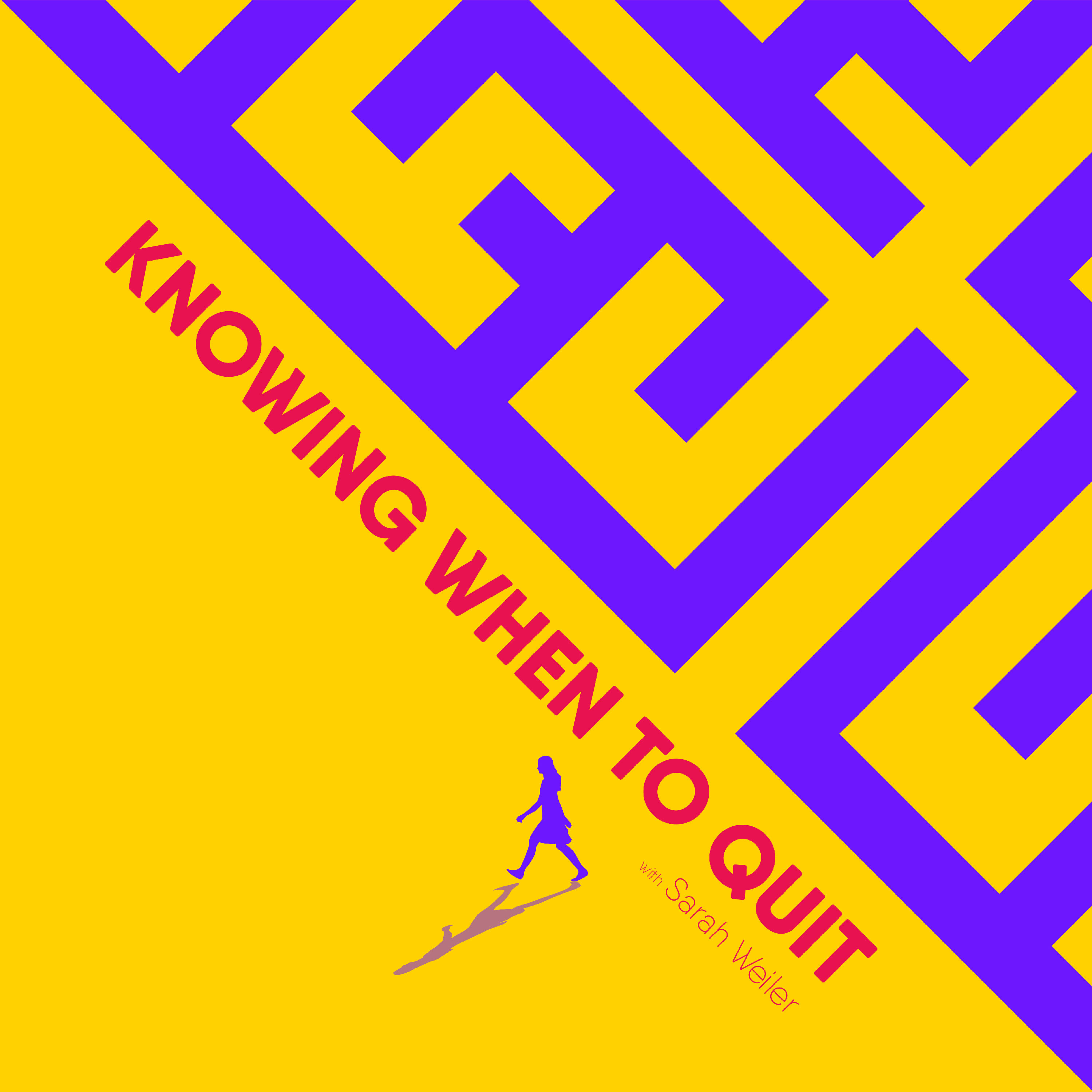
Knowing When to QuitS3 E6 - The Unexpected Joy of Heartbreak with Rosie WilbyToday we're talking about Knowing When to quit relationships. We live in a society which tells us that the hallmark of a good relationship is one that lasts for a long time, but does that mean that we often stay in relationships too long? Today's guest is Rosie Wilby - an award-winning comedian, author, speaker and the creator of global hit podcast and book The Breakup Monologues. Rosie believes that breakups shouldn't be feared, and that there can even be a world of joy and creativity waiting for us on the other side of heartbreak.In this e...
2023-10-161h 00
From Our Neurons to YoursAging and Brain Plasticity | Carla ShatzWhen we're kids, our brains are amazing at learning. We absorb information from the outside world with ease, and we can adapt to anything. But as we age, our brains become a little more fixed. Our brain circuits become a little less flexible. You may have heard of a concept called neuroplasticity, our brain's ability to change or rewire itself. This is of course central to learning and memory, but it's also important for understanding a surprisingly wide array of medical conditions, including things like epilepsy, depression, even Alzheimer's disease. Today's guest, Carla...
2023-06-0821 min
Knowing When to QuitS3 E5 - LIVE COACHING: Knowing when to quit the medical profession with Dr Jude Galea (Part 2)This is part 2 of a double episode with Dr Jude Galea on her decision to quit the medical profession after 20 years.This is a live coaching session where we explore this decision. At the end you'll hear a voice note from a few week's after the recording, with a final update.Thanks again, Jude for allowing us into your process. Dr Jude Galea is an A+E doctor of 20 years, the founder of the Witchy Women platform, and host the of the podcast Dr Body Mind Soul, both of which help people inform...
2023-05-201h 01
Knowing When to QuitS3 E4 - Knowing when to quit the medical profession with Dr Jude Galea (Part 1)I am so excited about today's episode, which is part 1 of a 2 part series with Dr Jude Galea - she's an A+E doctor of 20 years, the founder of the Witchy Women platform - and host the of the podcast Dr Body Mind Soul, both of which help people inform themselves about alternative therapies away from western medicine. Jude is changing the conversation about medicine and is in the process going through a big personal transformation with her identity as a doctor.The episode you're going to hear today was recorded exactly a year ago in May 2022 w...
2023-05-121h 03
From Our Neurons to YoursBrain Fog | Michelle MonjeOne of the strangest and most disconcerting things about the COVID 19 pandemic has been the story of long COVID.Many COVID long-haulers have continued experiencing cognitive symptoms long after their initial COVID infection — loss of attention, concentration, memory, and mental sharpness — what scientists are calling "brain fog". For some patients, the condition is so serious that it can be impossible to go back to their pre-COVID lives.Today’s guest, actually had an early intuition that COVID-19 could trigger a neurological health crisis.Michelle Monje is a pediatric neuro-oncologist here at Stanford...
2023-05-1120 min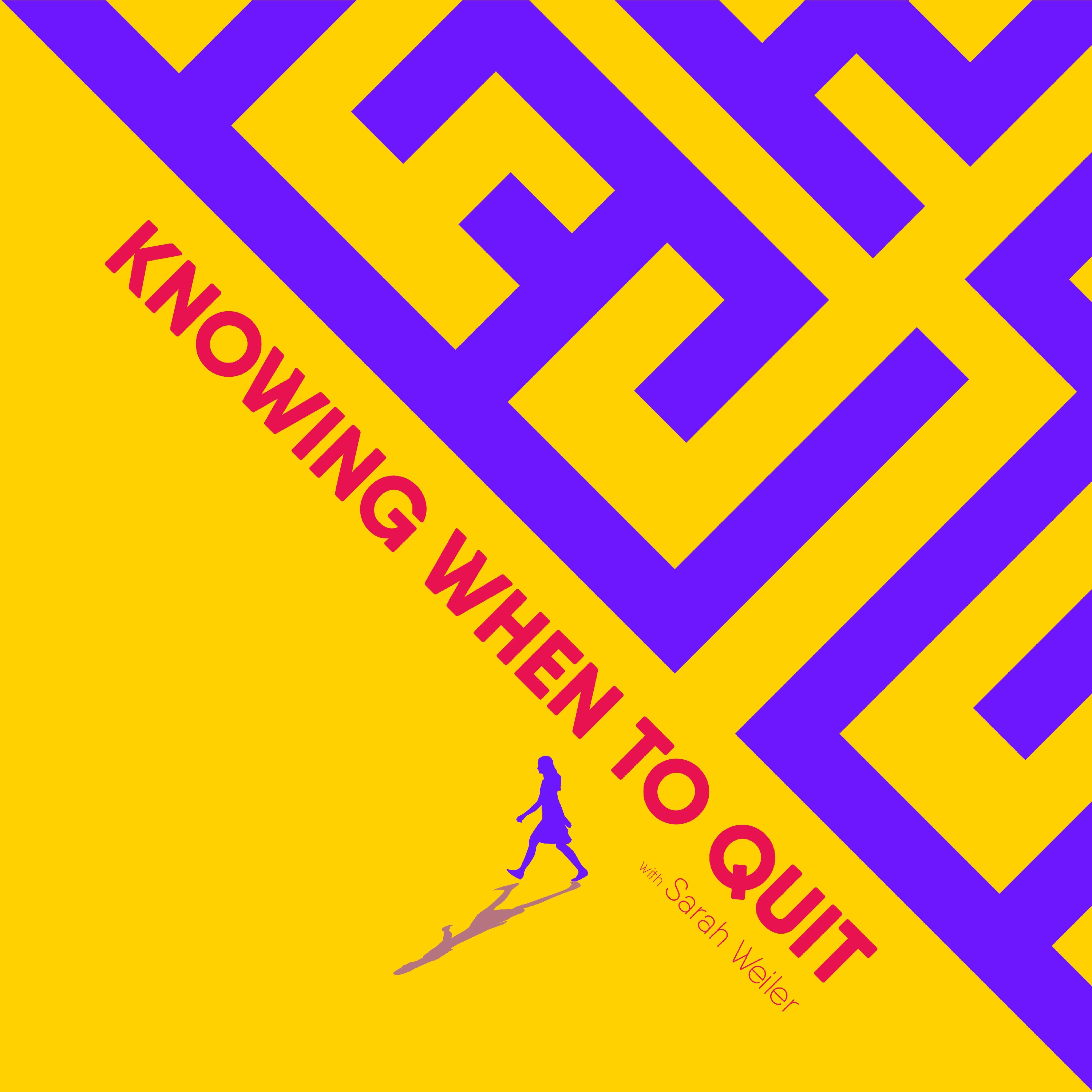
Knowing When to QuitS3 E3 - Selina Barker on quitting a double book deal and designing a life she lovesToday's show I have the wonderful Selina Barker - life design and career change coach, the author of Burnt Out, and founder of 'Project You' and the Hello 2023 Goodbye 2022 journal series.Selina was my entry point into designing a life I loved when I took her course back in 2013, and so it was a wonderful full circle to have her on the pod today. In this episode we discuss:🔥How we sometimes have to quit the big dream we've had for our careers💜 Why quitting is a really important part of designin...
2023-05-021h 05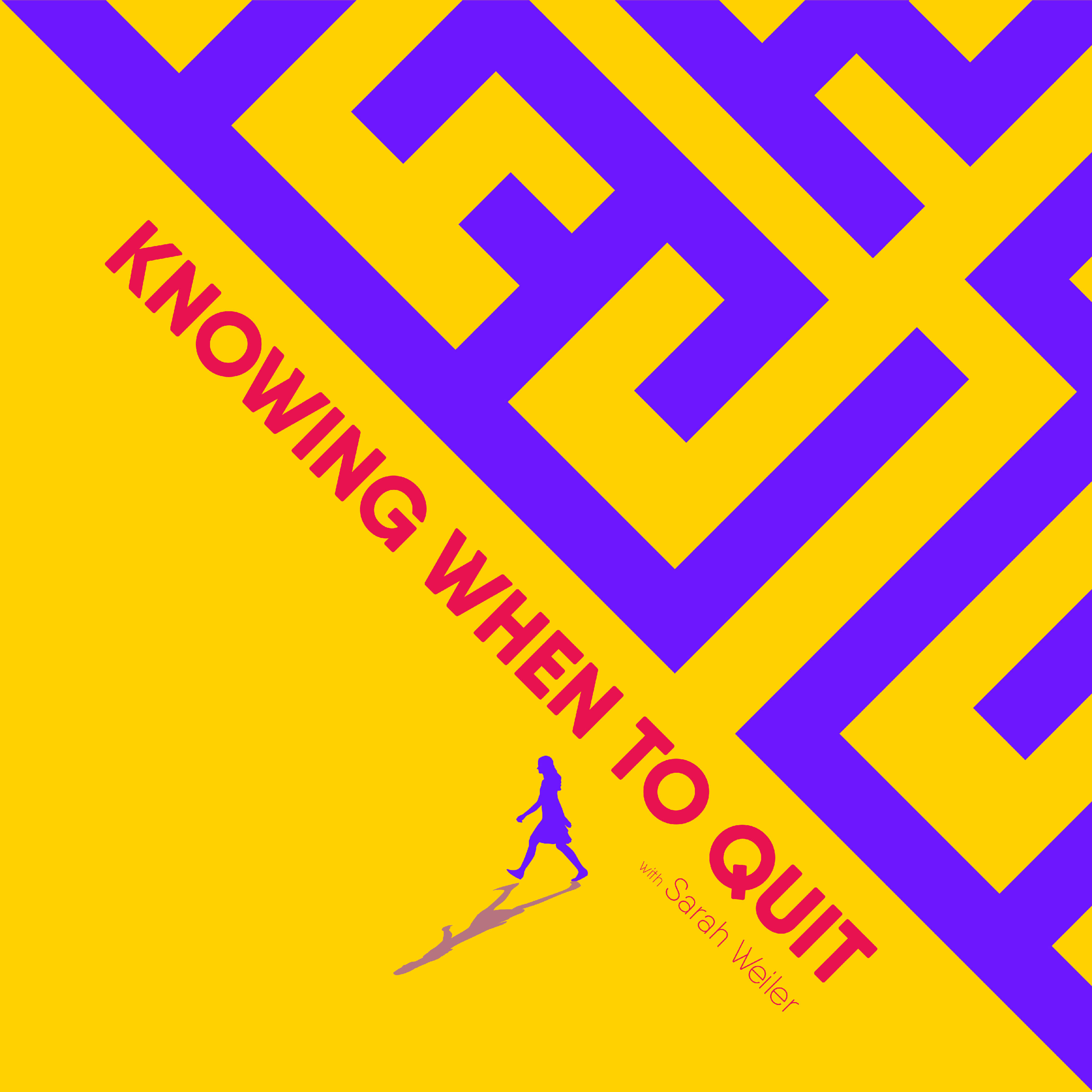
Knowing When to QuitS3 E2 - LIVE COACHING: I want to feel valued in teaching (Emily)Emily is a secondary school teacher in Yorkshire and when we met a few months ago she was really grappling with whether to stay in the profession. She was exhausted from the workload, the children and the families and was wondering if this was the right job for her. As many of you know, I also started my career in teaching and have recently returned to education to coach teachers. In this episode you'll listen to a coaching session between me and Emily where we explore what she wants out of a job and whether she can r...
2023-04-2148 min
Knowing When to QuitS3 E1 - Is it time to quit the dating apps? With Shani SilverWELCOME TO SERIES 3! Thanks for being here!Today we're talking about the dreaded dating apps, the damaging narrative about being single and how we can start to shift it.Shani Silver is a writer based in New Orleans. She hosts A Single Serving Podcast and is the author of A Single Revolution: Don’t look for a match. Light one. It’s a book that’s changing the narrative around being single, and hopefully helping single women feel better about this incredibly valuable time in our lives. She says 'I'm not an advocate for si...
2023-04-1450 min
From Our Neurons to YoursParenting Lessons from Frogs and Spiders | Lauren O'ConnellToday we’re going to talk about frogs — and spiders — as parents. What today’s show is really about is “pair bonding” — that’s the scientific term for the collaborative bonds that form between two parents — as well as the bonds between parents and their offspring. It turns out that if you look across the animal kingdom, strong family bonds are way more widespread than you might imagine. Frogs have them. Spiders have them. Fish have them.We wanted to learn more about the neuroscience behind these familial bonds across the animal kingdom — an...
2023-04-1319 min
Knowing When to QuitS2 E8 - Starting over: Leaving London and Quitting the Church - with Rob GrundelToday is a biggie. Have you ever changed your life so much that you feel like you're completely starting over again? Today's guest, Rob Grundel has done just that. After 12 years of living in London and building a life there, Rob said goodbye to the people, communities and projects he'd built and returned to Australia with his family. While in London Rob started the music community Imaginary Millions, ran his leadership coaching consultancy Somekind and was pastor for a small Christian community. He is now living in Australia with his family and is currently a principal at busi...
2023-03-231h 12
From Our Neurons to YoursBuilding a bionic eye | EJ ChichilniskyWe take this for granted, but our eyes are amazing. They're incredible. We process the visual world so automatically and so instantaneously, we forget how much work our eyes and our brains are doing behind the scenes, taking in light through the eyeball, transforming light into electrical signals in the retina, packaging up all that information, and sending it on to the brain, and then making sense of what it is we're seeing and responding to it.In fact, new science is showing that the eye itself, meaning the retina, is actually doing...
2023-03-0917 min
Knowing When to QuitS2 E7 - Sunsetting my business after 10 years - with Emma SextonTW: GriefIn today's episode I'm talking to Emma Sexton - an entrepreneur, marketing specialist, design thinker and creative doer.I met Emma back in 2016 when I was running a Female Founders Accelerator and she was working at the Kings Accelerator as Creative Expert in Residence. Back then we talked a lot about our love of starting ventures and knowing when to fold them. Emma has in the past run a successful radio show, taken women on regular trade missions to New York as well as bootstrapping a really successful creative agency - called Hands D...
2023-03-0955 min
From Our Neurons to YoursRespect your Biological Clock | Erin GibsonWe've probably all heard of circadian rhythms, the idea that our bodies have biological clocks that keep track of the daily cycle, sunrise to sunset. Maybe we've even heard that it's these biological rhythms that get thrown off when we travel across time zones or after daylight savings.So on one hand, it's cool that our body keeps track of what time it is, but today our question is just how important are our circadian rhythms to our health and wellbeing? Do we need to be paying attention to these daily rhythms and what happens...
2023-03-0215 min
From Our Neurons to YoursIs Addiction a Disease? | Keith HumphreysWhat makes addiction a disease? I think we all know at this point that addiction is another major epidemic that is sweeping our country and the world, but there are few topics that are more misunderstood than addiction. In fact, some people question whether addiction is even truly a disease. To delve into this question of why neuroscientists and health policy experts do think of addiction as a disease, I spoke to Keith Humphreys, the Esther Ting Memorial Professor of Psychiatry and Behavioral Sciences at Stanford, who is a leading expert on the ad...
2023-02-2310 min
Knowing When to QuitS2 E6 - Life after Divorce - with Zaira MughalTW: Suicide When I first thought about this podcast, I knew that I didn't just want to talk about jobs + businesses. Today, I have my dear friend, arts psychotherapist, and wise wise woman Zaira Mughal on the podcast sharing about her divorce.It's a deep, honest episode about the cultural, societal and emotional reasons we hold on to relationships, even if all the signs are there that it is over.What Zaira has gone on to do since her divorce though, is truly remarkable. For anyone, who is feeling totally lost...
2023-02-1757 min
From Our Neurons to YoursYour gut - the second brain? | Julia KaltschmidtYou may have heard the idea that the gut is the second brain, but what does that really mean? Maybe it has to do with the fact that there are something like 100 to 600 million neurons in your gut. That's a lot of neurons. That's about as many as you'd find in the brain of say, a fruit bat, or an ostrich, or a Yorkshire Terrier. And it turns out, this network of intestinal neurons, termed by scientists the "enteric nervous system," can actually have a lot of impact on our daily lives – not jus...
2023-02-1614 min
From Our Neurons to YoursThe Octopus Brain | Ernie Hwaun & Matt McCoyWhat can octopus and squid brains teach us about intelligence?One of the incredible things about octopus's is that not only do they have an advanced intelligence that lets them camouflage themselves, use tools and manipulate their environments and act as really clever hunters in their ecosystems, they do this with a brain that evolved essentially from something like a slug in the oceans hundreds of millions of years ago.Our brains share virtually nothing in common with theirs. The question for scientists is what can studying a creature with a completely different...
2023-02-0913 min
From Our Neurons to YoursThe Mystery of Migraines | Gabriella MuwangaIf you've ever had a migraine, you know that the symptoms — splitting headache, nausea, sensitivity to light — mean you're going to want to spend some time in bed, in a dark room. Migraines are flat out debilitating, and the statistics back this up.Migraines are the third most common neurological disorder. They affect as many as a billion people around the world, making them one of the world's 10 most disabling diseases according to the World Health Organization. But for all the misery for those who suffer from migraines, it's been a long haul for...
2023-02-0213 min
Knowing When to QuitS2 E5 - How to keep going with the things that really matter to you - with Robbie SwaleThe place you feel the most resistance is the most important place for your soul's evolution...In today's episode we look at the other side of quitting: NOT quitting.Whenever we start a new project, habit or venture there is a part of us that is screaming to give up. How do we know if this is fear talking or a voice we should listen to? How do we keep going even if we're feeling a lot of resistance? What if we don't feel like we are a real (insert word) writer/creative/musician/poet...
2023-02-0159 min
From Our Neurons to YoursPsychedelics and Empathy | Rob MalenkaWhy are psychiatrists taking a fresh look at MDMA? Recently, there's been growing excitement in the scientific community about revisiting the potential medical benefits of psychedelic drugs that have been off limits for decades. Scientists are discovering or rediscovering applications of psilocybin, LSD, MDMA, and other compounds for treating people with depression, anxiety, and post-traumatic stress disorder. The Wu Tsai Neurosciences Institute has several leading experts paving the way in this field, including today's guest, Robert Malenka. Beginning in the 1980s, Malenka pioneered neuroscientists' understanding of how our brain circuits to change with experience by...
2023-01-2618 min
Knowing When to QuitS2 E4 - Knowing When to Quit the idea of having children - with Kim WillisOoof! This is a big topic today, and one we've been wanting to put out for a while. Between our mid 30s and mid 40s most women are preoccupied with a big decision - whether or not to have children. The decision is complicated: while it's partly in our hands, it's also, in many ways totally not. We wanted to have a frank discussion about what it means to be in this time of deliberation, how we personally navigate the uncertainty, and the opportunity we have to build a new narrative for childfree women.
2023-01-201h 10
Knowing When to QuitS2 E3 - Knowing When To Quit being ''Totally Fine'' with Tiffany PhillipouTW: suicide and griefIn 2008 Tiffany Philippou returned to university, having lost her boyfriend to suicide over the summer. For the next decade she kept herself busy with work, love and London - anything to take her mind off facing her grief.Now, 14 years on, she's written a memoir documenting her 20s and the journey she went on to stop pretending that things were 'totally fine.' It's brave, raw and honest and a reminder for anyone grieving that it's okay to ask for help. In this final episode of 2022 we discuss:
2022-12-2058 min
ENJOY-Yachting PodcastGarantie, Gewährleistung, After Sales
boot Düsseldorf Refit Talk
ENJOY-Yachting Podcast
Langfahrtsegeln
Segelradio Bordgespräche
Segelradio Literatur
Segelradio Nachrichten
Segelradio Regatta
Segelradio Science
Segelradio Sondersendung
Segelradio Sundowner
Nach dem Bootskauf kommt der Service. Erste Ansprechpartnerin für alle Kundenbelange ist dann häufig Katharina Köke. Sie kümmert um den Bereich After Sales, Gewährleistung und Garantie. In der neunten Folge aus der Reihe Bootskauf von A bis Z bespricht sie mit Lars Reisberg, wie man die Service-Begriffe auseinanderhalten muss und worauf es bei der Feststellung von Mängeln oder Fehlern bei der Produktion ankommt. Daneben gibt sie aber auch interessante Einblick...
2022-12-0937 min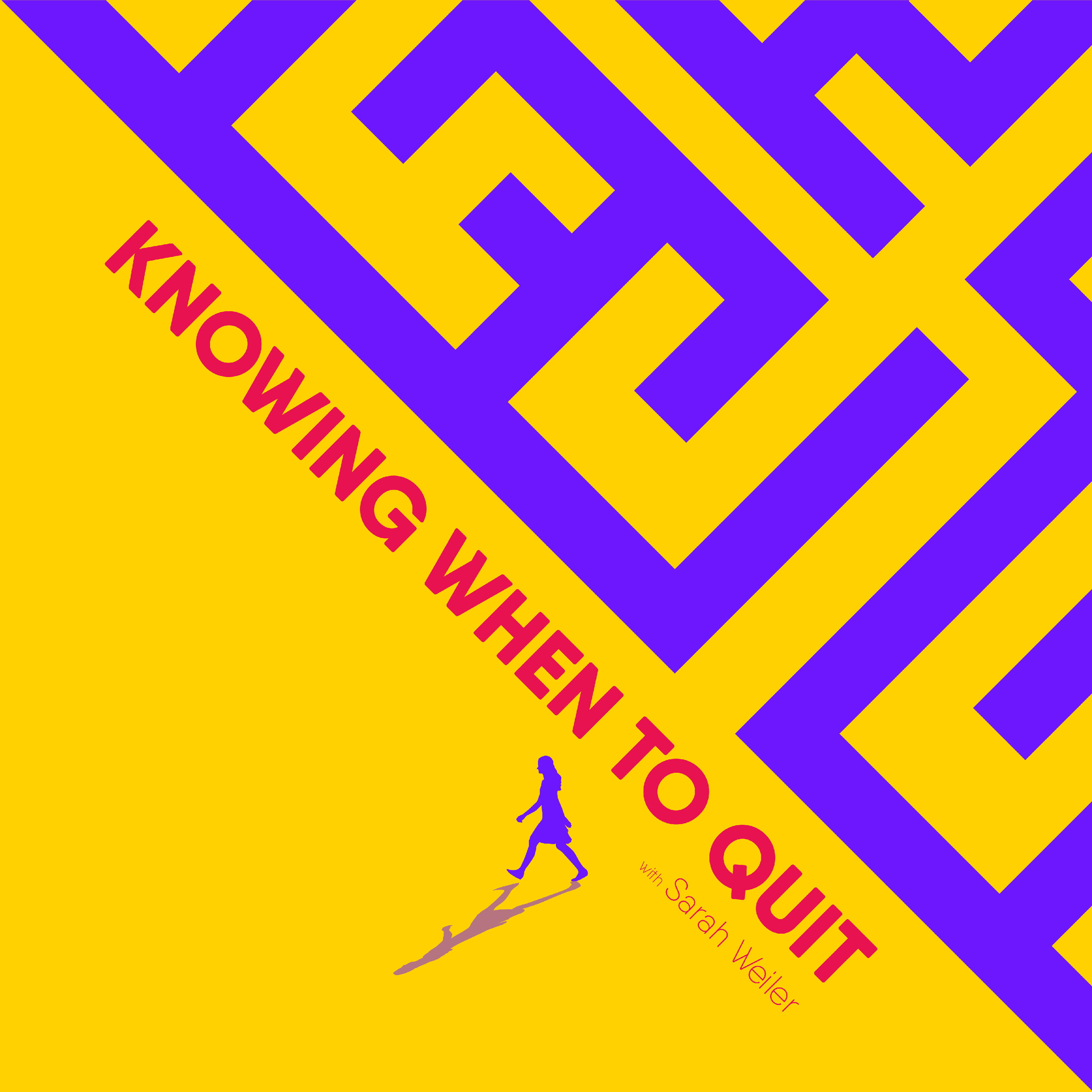
Knowing When to QuitS2 E2 - What can ADHD teach us about Quitting? w/Matthew BellringerWhat can ADHD teach us about Knowing When to Quit? Today's guest Matthew Bellringer has some ideas...Matthew is a divergent innovation guide, neurodiversity advocate and social entrepreneur. They believe that with the right support, unconventional people can make a unique contribution to addressing big, messy problems that affect everyone. Working with (mostly) neurodivergent professionals, academics, and entrepreneurs, Matthew helps establish original approaches to complex issues. They also work with organisations to create the kind of spaces which support this work.In this episode we explore:🧐 Why having a short attention span can be a...
2022-12-091h 02
ENJOY-Yachting PodcastProfessionelle Yacht-Übergabe
boot Düsseldorf Refit Talk
ENJOY-Yachting Podcast
Langfahrtsegeln
Segelradio Bordgespräche
Segelradio Literatur
Segelradio Nachrichten
Segelradio Regatta
Segelradio Science
Segelradio Sondersendung
Segelradio Sundowner
Endlich ist es so weit: Ihre neue Yacht ist fertig! Jetzt steht die Übergabe an. – In dieser Episode aus der ENJOY-YACHTING-Podcast-Reihe zum Bootskauf geht es darum, was Sie als Kunde und frisch gebackener Eigner während der Bootsübergabe erwartet und auch darum, was sie erwarten können. Denn dieser Service ist auch ein Teil der Verkaufsverhandlung mit Ihrem Bootshändler. Thore Alke, Leiter der ENJOY-YACHTING Technik Abteilung verrät im Gespräch mit Lars Reisberg, w...
2022-11-2147 min
SegelradioLiteratur im Herbst mit Detlef Jens und Hinnerk Weiler
boot Düsseldorf Refit Talk
Das Literaturboot im Segelradio
ENJOY-Yachting Podcast
Langfahrtsegeln
Segelradio Bordgespräche
Segelradio Nachrichten
Segelradio Regatta
Segelradio Science
Segelradio Sondersendung
Segelradio Sundowner
Ich kam überraschend nach Flensburg und meine Hausaufgaben in Sachen Literatur sind auch noch nicht fertig. Darum sprechen wir statt über Klassiker der maritimen Literatur über Klassiker der Navigation, Norwegen, den Nord-Ostsee-Kanal und das Reisen entlang der europäischen Atlantikküste.Wer zum Segeln auf den Atlantik geht, sollte erst einmal im kleinen Üben.
Die Ostsee (und Nordseeküste Jütlands) kennt Jan Werner wie seine Westentasche. In seinen Dänemarkführern trägt...
2022-11-0154 min
Segelradio LiteraturLiteratur im Herbst mit Detlef Jens und Hinnerk Weiler
boot Düsseldorf Refit Talk
ENJOY-Yachting Podcast
Langfahrtsegeln
Segelradio Bordgespräche
Segelradio Literatur
Segelradio Nachrichten
Segelradio Regatta
Segelradio Science
Segelradio Sondersendung
Segelradio Sundowner
Ich kam überraschend nach Flensburg und meine Hausaufgaben in Sachen Literatur sind auch noch nicht fertig. Darum sprechen wir statt über Klassiker der maritimen Literatur über Klassiker der Navigation, Norwegen, den Nord-Ostsee-Kanal und das Reisen entlang der europäischen Atlantikküste.Wer zum Segeln auf den Atlantik geht, sollte erst einmal im kleinen Üben.
Die Ostsee (und Nordseeküste Jütlands) kennt Jan Werner wie seine Westentasche. In seinen Dänemarkführern trägt er nicht n...
2022-11-0154 min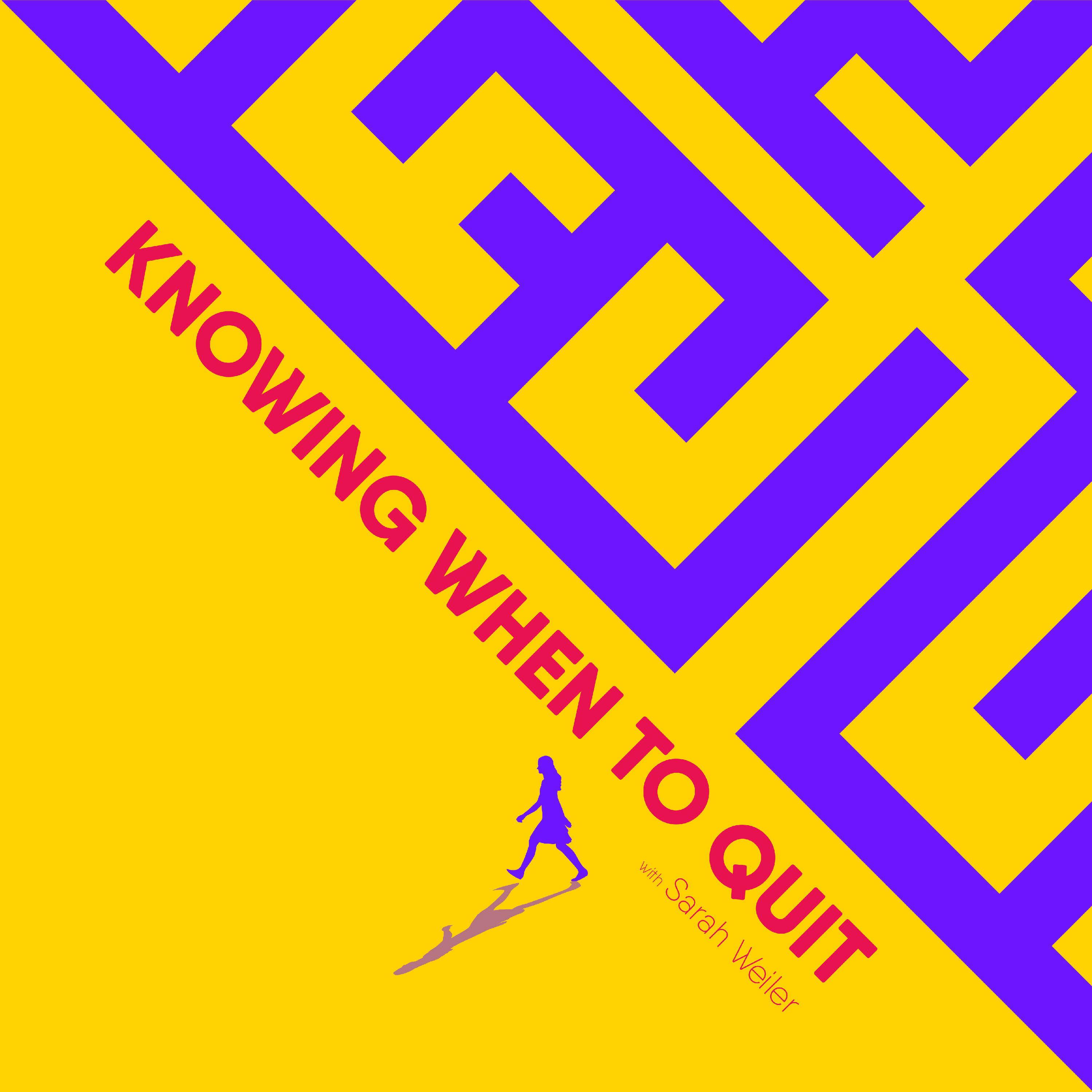
Knowing When to QuitS2 E1 - Samantha Moyo on trusting the fertile void, non-binary thinking, and reimagining the way we do business''When we think nothing is happening, A LOT is happening.''- Sam MoyoWelcome to SERIES 2 of Knowing When to Quit! We're so excited to have you back here. This week I'm speaking to Samantha Moyo: Founder of Morning Gloryville (MGV), Creative Coach and Consultant, and as of this summer Shambala Festival's favourite cowgirl. If you don't know MGV, it was a revolutionary sober rave movement, which got people up at 6am to dance to the likes of Fatboy Slim before work. It had huge success all over the globe, and yet, there...
2022-10-311h 04
SegelradioHinter den Kulissen des Trans Ocean e.V. – "Geschäftsführerin" Anja LebenhagenDie Rolle, die Anja Lebenhagen ab Oktober in Cuxhaven beim Trans Ocean e.V. übernimmt, muss sie erst noch gemeinsam mit dem Vorstand im Detail ausdefinieren. Sicher ist nur, dass es mehr als einfach nur eine Büroleitung, aber eben auch nicht ganz, das sein wird, was landläufig eine Geschäftsführung ausmacht. Klar ist auch: Sie wird die Gestaltung der Vereinsaktivitäten und das Bild von Deutschlands Weltumseglerverein in den kommenden Jahren wesentlich mitprägen. Im vergangenen Sommer haben Kirsten Panzer und ich sie zuhause in ihrem Garten bei Bremerhaven besucht. – Wer ist Anja Lebenhagen, wie sieht sie ihre Roll...
2022-09-3025 min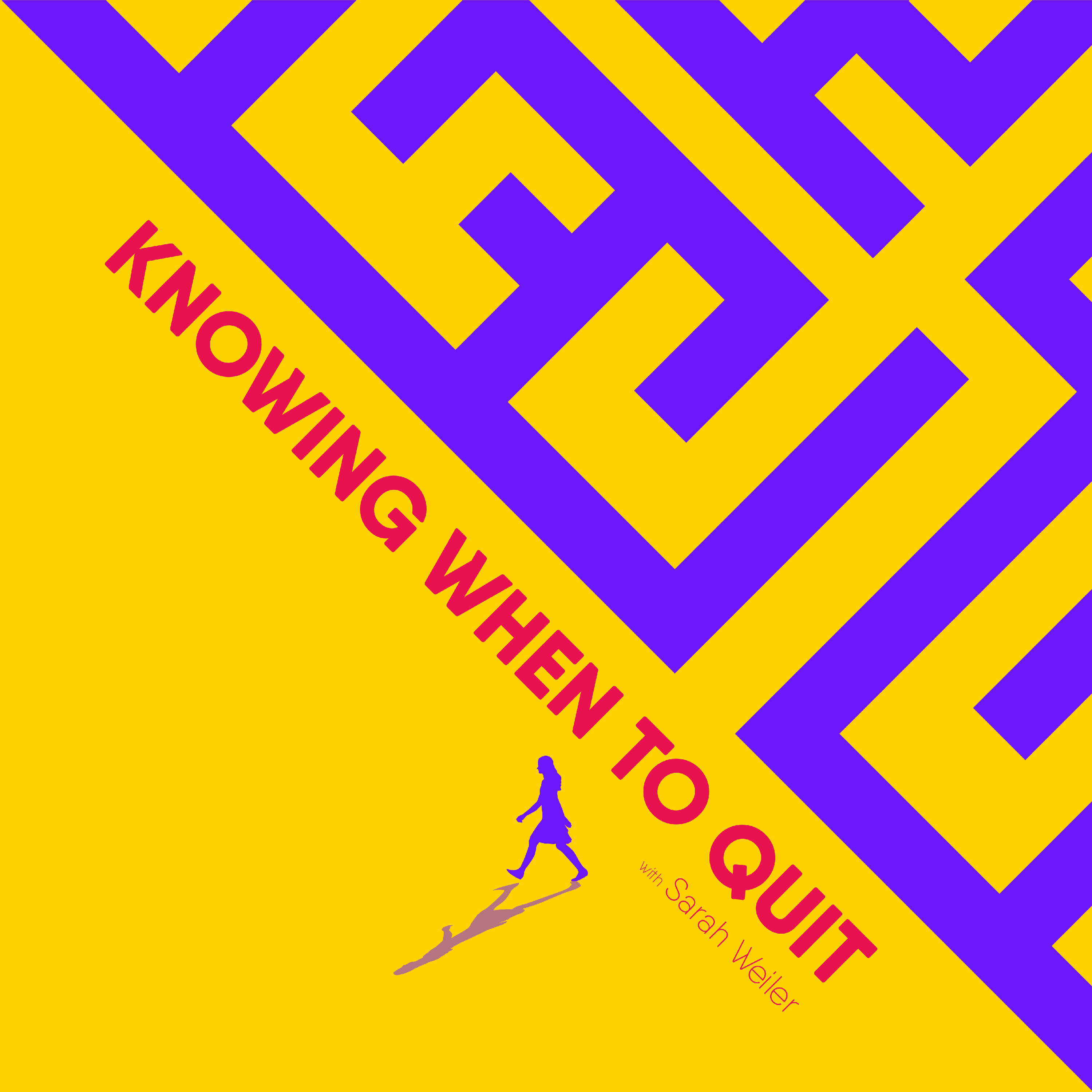
Knowing When to QuitGiving our Projects a Beautiful Ending - End of S1 Reflections Part 3Hello! Welcome back.In between Series 1 and 2 I've taken some time to reflect on my own journey with Quitting since the podcast began in November 2020. In Part 1 I looked at the podcast itself and use the Quitting Quadrantl® Framework to map my journey from Beginners' Flow, to Midway Burnout... In Part 2 I reflected on two big life changes that I was committed to starting in 2021 but that in the end I didn't go through with.In Part 3 I talk about 'Beautiful Endings' and the importance of ending projects with grace and c...
2022-09-2120 min
Knowing When to QuitQuitting Big Post-Pandemic Life Changes - End of S1 Reflections Part 2Hello! Welcome back.In between Series 1 and 2 I've taken some time to reflect on my own journey with Quitting since the podcast began in November 2020. In Part 1 I look at the podcast itself and use the Quitting Quadrantl® Framework to map my journey from Beginners' Flow, to Midway Burnout... In Part 2 I reflect on two big life changes that I was committed to starting in 2021 but that in the end I didn't go through with: namely moving abroad and starting a Masters. I talk about how I made the decisions, the emotions I e...
2022-09-2122 min
Knowing When to QuitNot Quitting the Quitting Podcast - End of S1 Reflections Part 1Hello! Welcome back.In between Series 1 and 2 I've taken some time to reflect on my own journey with Quitting since the podcast began in November 2020. In Part 1 I look at the podcast itself and use the Quitting Quadrantl® Framework to map my journey from Beginners' Flow, to Midway Burnout... You may recognise your own patterns with creative projects as I talk through the model. In Part 2 I reflect on two big life changes that I was committed to starting in 2021 but that in the end I didn't go through with. I talk about h...
2022-09-2112 min
ENJOY-Yachting PodcastDie neue Yacht versichern
boot Düsseldorf Refit Talk
ENJOY-Yachting Podcast
Langfahrtsegeln
Segelradio Bordgespräche
Segelradio Literatur
Segelradio Nachrichten
Segelradio Regatta
Segelradio Science
Segelradio Sondersendung
Segelradio Sundowner
Haftpflicht, Kasko, Rechtsschutz: Die Liste der möglichen Versicherungen für Ihre neue Yacht ist lang. Welche sollten Sie haben, welche sind empfehlenswert und welche nur im Spezialfall zu empfehlen? Wonach berechnen sich die Policen, wie hoch sind Selbstbeteiligungen und was müssen vor allem Erstkäufer beachten? Das alles und noch mehr erfahren Sie im Teil 7 des Podcasts „Yachtkauf von A bis Z: Versicherungen“. Lars Reisberg im Gespräch mit dem PANTAENIUS-Experten Dirk Hilcken.
Diese...
2022-08-291h 06
ENJOY-Yachting PodcastYachttransport: Die erste Schiffsreise geht immer über Asphalt
boot Düsseldorf Refit Talk
ENJOY-Yachting Podcast
Langfahrtsegeln
Segelradio Bordgespräche
Segelradio Literatur
Segelradio Nachrichten
Segelradio Regatta
Segelradio Science
Segelradio Sondersendung
Segelradio Sundowner
Wenn Yachten gebaut werden, dann meist weit weg von dem Revier, in dem sie später genutzt werden. Daher geht die erste große Reise eines neuen Bootes fast immer über die Straße: Was alles hinter einem Yachttransport steht, welche Dinge die Transporteure zu beachten haben und warum dies so ein großer Posten auf dem Angebot eines Bootshändlers ist, bespricht ENJOY YACHTING-Bootsexperte und Moderator Lars Reisberg mit Wilfried Brink, Gründer von Sleepy, e...
2022-07-1349 min
ENJOY-Yachting PodcastIch habe ein Boot gekauft! Was jetzt?
boot Düsseldorf Refit Talk
ENJOY-Yachting Podcast
Langfahrtsegeln
Segelradio Bordgespräche
Segelradio Literatur
Segelradio Nachrichten
Segelradio Regatta
Segelradio Science
Segelradio Sondersendung
Segelradio Sundowner
„Endlich! Ich habe für mein neues Boot unterschrieben – doch: Was jetzt?!“
In dieser Folge sprechen wir mit einem frisch gebackenen Eigner darüber, was auf frisch gebackene Eigner so alles zukommt. Dabei wird unser eigentlicher Moderator Lars Reisberg, der sich ganz frisch eine neue First 27 SE gekauft hat, selbst zum Interviewgast.
Wie lief der Kauf ab? Was kam danach? Liegeplatz, Ausrüstung, Geschirr und und und … was sonst noch so alles zu beac...
2022-06-0956 min
SegelradioLossegeln von England zu den Kanaren
boot Düsseldorf Refit Talk
Das Literaturboot im Segelradio
ENJOY-Yachting Podcast
Langfahrtsegeln
Segelradio Bordgespräche
Segelradio Nachrichten
Segelradio Regatta
Segelradio Science
Segelradio Sondersendung
Segelradio Sundowner
Bereits im vergangenen Jahr haben Marlene und Bert Frisch mit einer exemplarischen Reise die ersten Etappen des Langfahrtseglerlebens und Besonderheiten zwischen der Elbmündung und dem westlichen Zipfel des englischen Kanals beschrieben. Jetzt geht es endlich weiter nach Süden, über die Biskaya, an Portugal vorbei und zum ersten Mal auf den großen Atlantischen Ozean. Dort zieht es viele Crews Richtung Karibik zuerst nach Las Palmas auf Gran Canaria zum Start der Atlant...
2022-06-031h 22
ENJOY-Yachting PodcastKaufen oder finanzieren?
boot Düsseldorf Refit Talk
ENJOY-Yachting Podcast
Langfahrtsegeln
Segelradio Bordgespräche
Segelradio Literatur
Segelradio Nachrichten
Segelradio Regatta
Segelradio Science
Segelradio Sondersendung
Segelradio Sundowner
Sätze wie: „Ein Boot muss man sich leisten können!“, „Nur Bar bezahlt ist richtig bezahlt“, „Sowas kauft man nicht auf Kredit!“ hören Lars Reisberg und seine Kollegen oft in Kundengesprächen, wenn es um das Thema Finanzierung geht. Dabei ist beispielsweise ein Autokauf oder der neue Caravan auf Kredit heute völlig normal. Bei Booten scheint das aber nicht so zu sein. Was es mit diesen – und anderen – Mythen auf sich hat, welche Möglichkeiten de...
2022-05-1149 min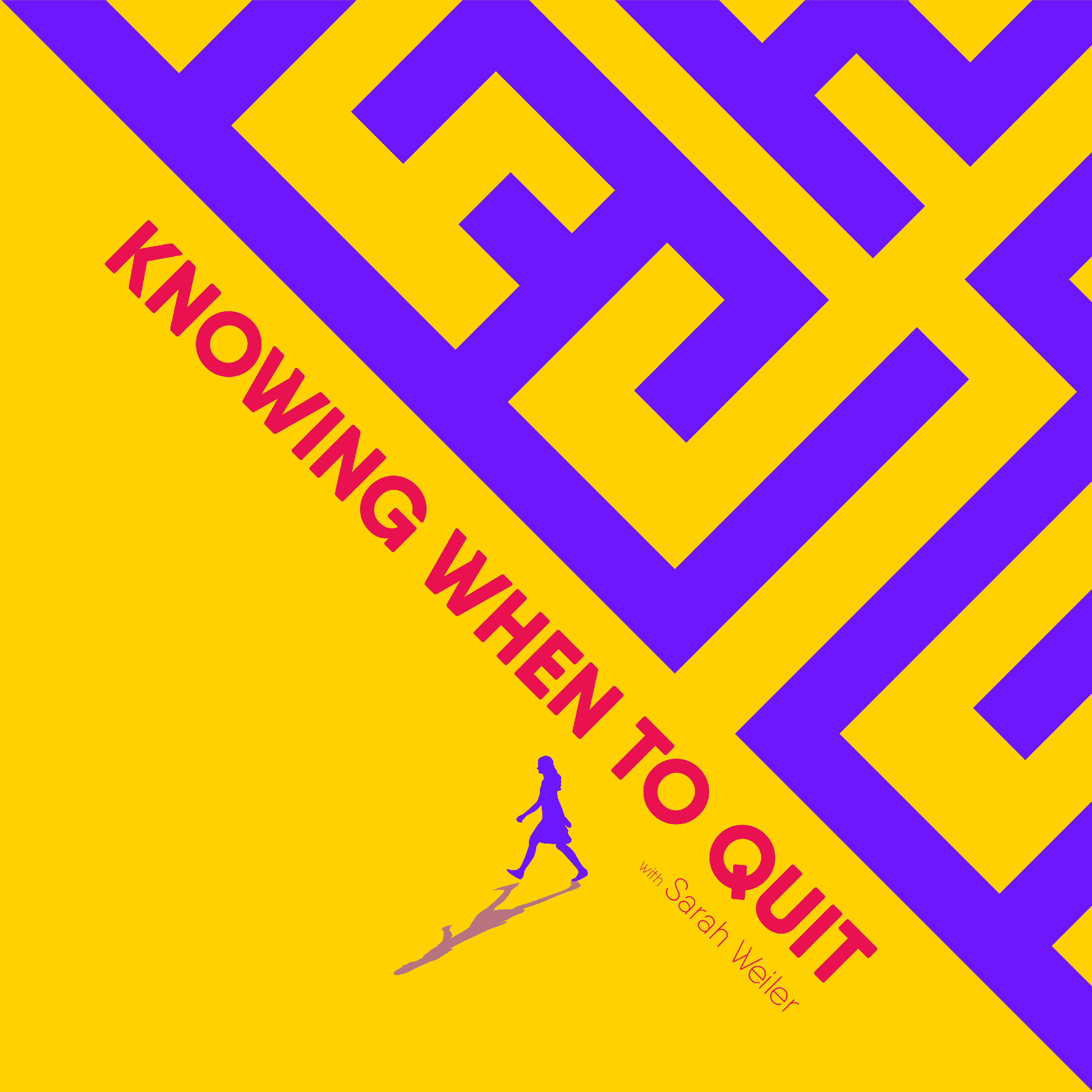
Knowing When to QuitS1 E8 - Two Burnouts and a Vipassana - with Vicky Johnson (Co-Founder Museum of Happiness)‘I had all the external support I could have hoped for, but it still wasn’t making me happy. There was a deeper, bigger, issue within me.’This week we talk to Vicky Johnson - Co-founder & Director at the Museum of Happiness, an organisation which uses the Science of Happiness to spread more love, peace and happiness into the world.You'd imagine that to run a Museum of Happiness you'd have to have a pretty sunny disposition, and you wouldn't be wrong. Vicky is one of the most positive people I've worked with - uber-resilient and fu...
2022-04-2753 min
Knowing When to QuitS1 E7 - How to Quit as an Ideas Person - with John Williams‘If you’ve waited until the point until you hate the thing to close it, you’ve waited too long.’John Williams is the bestselling author of 'F**k Work Let's Play' and a coach for creative entrepreneurs who want to make money from the things they love.I first met John 10 years ago when I attended one of his Scanners' nights and it's no exaggeration to say that his work changed the course of my career. John helps people to see that they can get 'paid to play', but that in order to do that you...
2022-04-0851 min
SegelradioWie bekomme ich das meiste Boot für mein Geld?
boot Düsseldorf Refit Talk
Das Literaturboot im Segelradio
ENJOY-Yachting Podcast
Langfahrtsegeln
Segelradio Bordgespräche
Segelradio Nachrichten
Segelradio Regatta
Segelradio Science
Segelradio Sondersendung
Segelradio Sundowner
Im dritten Teil der Serie sprechen wir über alles, was mit dem Bootspreis zu tun hat: Begriffe wie „Basisboot“ oder „ab Werft“ sind oft in den Tests der Yachtmagazine zu lesen. Ebenso das ominöse „segelfertig“. Doch was bedeuten diese Begriffe und sind die Preisangaben in Magazinen, Anzeigen und dem Netz wirklich aussagekräftig? Außerdem: Wie kommen Neulinge auf einen realistischen Bootspreis? Und Tipps für das erfolgreiche Verhandeln. Wir sprechen mit ENJOY YACHTING-Gründ...
2022-04-0747 min
ENJOY-Yachting PodcastWie bekomme ich das meiste Boot für mein Geld?
boot Düsseldorf Refit Talk
ENJOY-Yachting Podcast
Langfahrtsegeln
Segelradio Bordgespräche
Segelradio Literatur
Segelradio Nachrichten
Segelradio Regatta
Segelradio Science
Segelradio Sondersendung
Segelradio Sundowner
Im dritten Teil der Serie sprechen wir über alles, was mit dem Bootspreis zu tun hat: Begriffe wie „Basisboot“ oder „ab Werft“ sind oft in den Tests der Yachtmagazine zu lesen. Ebenso das ominöse „segelfertig“. Doch was bedeuten diese Begriffe und sind die Preisangaben in Magazinen, Anzeigen und dem Netz wirklich aussagekräftig? Außerdem: Wie kommen Neulinge auf einen realistischen Bootspreis? Und Tipps für das erfolgreiche Verhandeln. Wir sprechen mit ENJOY YACHTING-Gründer und CEO Meik Les...
2022-04-0747 min
SegelradioLesen im Segelfrühling
boot Düsseldorf Refit Talk
Das Literaturboot im Segelradio
ENJOY-Yachting Podcast
Langfahrtsegeln
Segelradio Bordgespräche
Segelradio Nachrichten
Segelradio Regatta
Segelradio Science
Segelradio Sondersendung
Segelradio Sundowner
Segelradio Shownotes
Lesen im Segelfrühling
Die Segelsaison 2022 steht in den Startlöchern. Zeit, den Lesestoff dafür zu besprechen. Nach langer Winterpause trifft sich Hinnerk Weiler dazu wieder mit dem Macher von Literaturboot.de und Segelkrimi-Autor Detlef Jens. Es geht dabei aber nicht nur um die Bücher auf Detlefs Nachttisch oder die neuesten Werke aus der Segelfachbuchecke. Ziel der Literatur-Reihe im Segelradio ist weiterhin Lesenswertes zusammenzutragen, das Lust a...
2022-03-311h 22
Segelradio LiteraturLesen im Segelfrühling
boot Düsseldorf Refit Talk
ENJOY-Yachting Podcast
Langfahrtsegeln
Segelradio Bordgespräche
Segelradio Literatur
Segelradio Nachrichten
Segelradio Regatta
Segelradio Science
Segelradio Sondersendung
Segelradio Sundowner
Segelradio Shownotes
Lesen im Segelfrühling
Die Segelsaison 2022 steht in den Startlöchern. Zeit, den Lesestoff dafür zu besprechen. Nach langer Winterpause trifft sich Hinnerk Weiler dazu wieder mit dem Macher von Literaturboot.de und Segelkrimi-Autor Detlef Jens. Es geht dabei aber nicht nur um die Bücher auf Detlefs Nachttisch oder die neuesten Werke aus der Segelfachbuchecke. Ziel der Literatur-Reihe im Segelradio ist weiterhin Lesenswertes zusammenzutragen, das Lust auf neue K...
2022-03-311h 22
SegelradioNeue Stimmen im Segelradio
boot Düsseldorf Refit Talk
Das Literaturboot im Segelradio
ENJOY-Yachting Podcast
Langfahrtsegeln
Segelradio Bordgespräche
Segelradio Nachrichten
Segelradio Regatta
Segelradio Science
Segelradio Sondersendung
Segelradio Sundowner
Es gibt neue Stimmen im Segelradio. Die von Lars Reisberg und ab dieser Episode habe ich auch „Moderatorenunterstützung aus der Konserve“. – Lars veröffentlich eine zehnteilige Reihe zum Bootskauf im Segelradio, unterstützt wird die Produktion durch seinem Arbeitgeber Enjoy Yachting.
2022-03-3104 min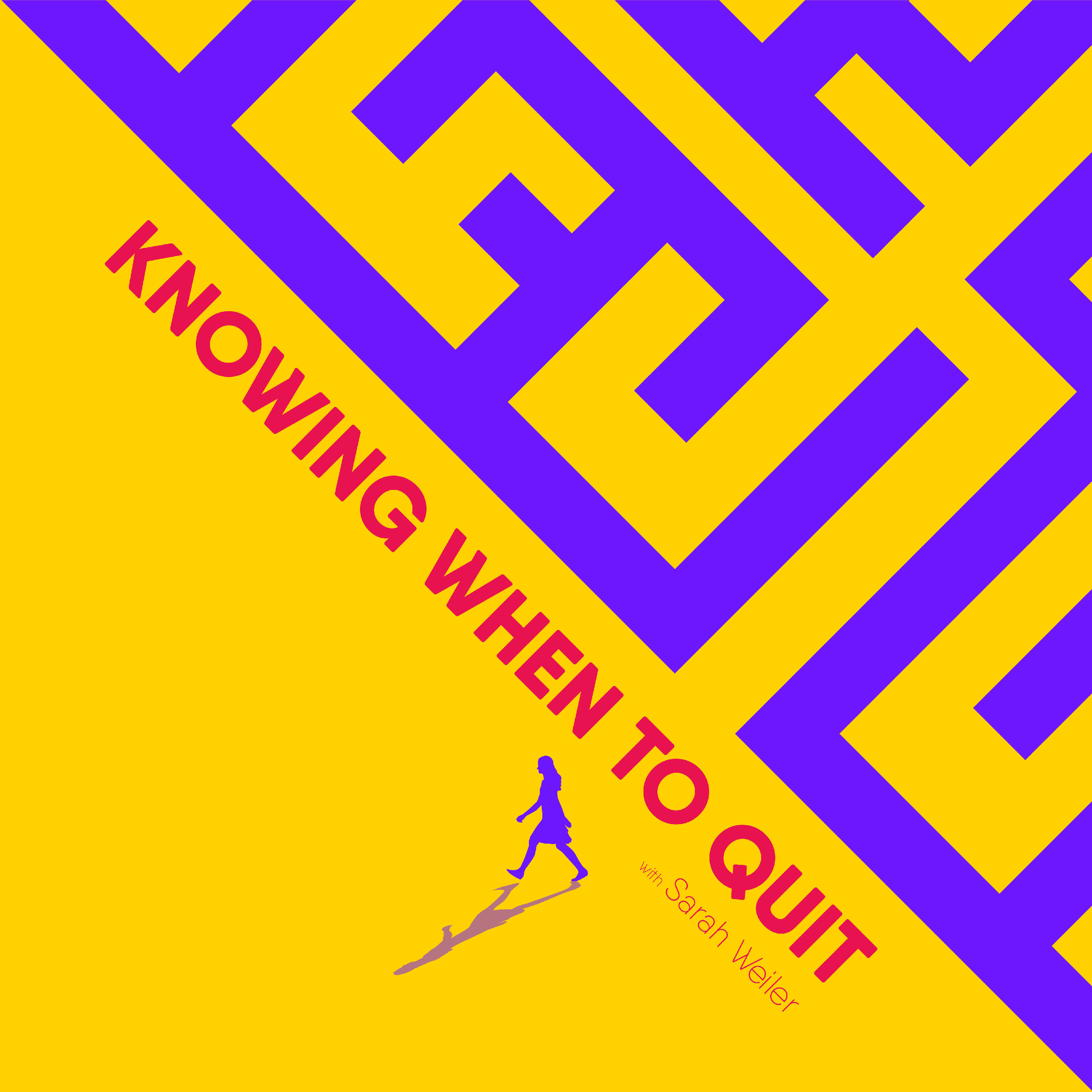
Knowing When to QuitS1 E6 - Knowing When to Quit the PHD - with Mathy Silvakumaran‘Quitting doesn’t have to mean stopping the car and getting out - it can just be taking a different direction.’Today's episode is with Mathy Silvakumaran - she's a writer, filmmaker and disability activist from Yorkshire, who is sharing her story of knowing when to quit her PHD.In this episode we explore:🧘🏽♀️The importance of taking time away to get clarity and headspace on a decision.😣 How worrying you 'always quit things' can make you double down and stay somewhere against your better judgement.🧭 Navigating the world as a disabled person and...
2022-03-3150 min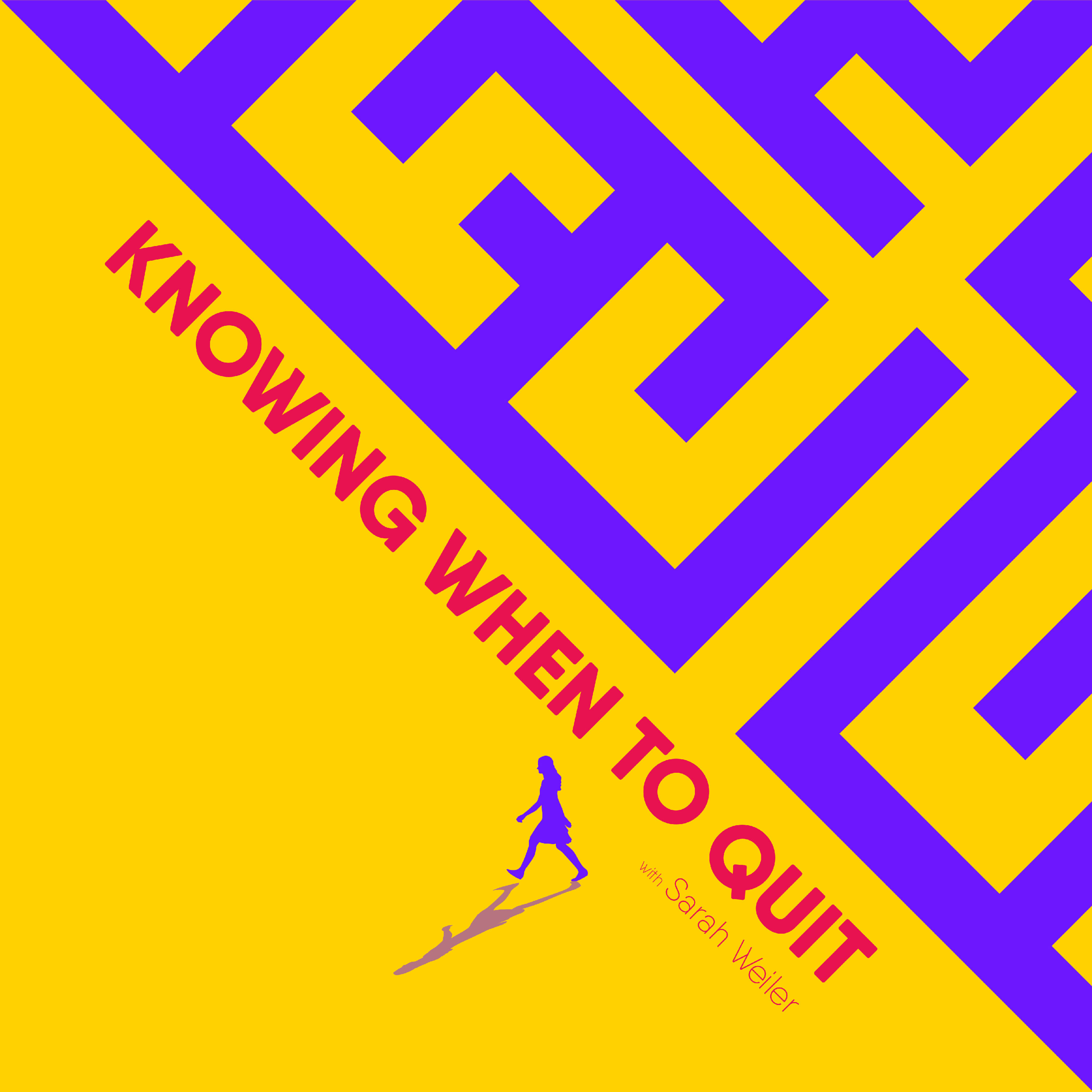
Knowing When to QuitS1 E5 - Using Your Intuition with Amisha Ghadiali‘That time my body just went ‘no no no no’ I can’t do this.’Amisha Ghadiali is the host of podcast and founder ofAll That We Are (previously Future is Beautiful) and author of Intuition - Access Your Inner Wisdom. Trust Your Instincts. Find Your Path published in 2021.Amisha has been a visionary in the way that she's worked, allowing ideas to come to her and using her intuition to birth new and trailblazing concepts into the world. In this episode we discuss:💡Whether a project or idea takes up energy...
2022-03-2446 min